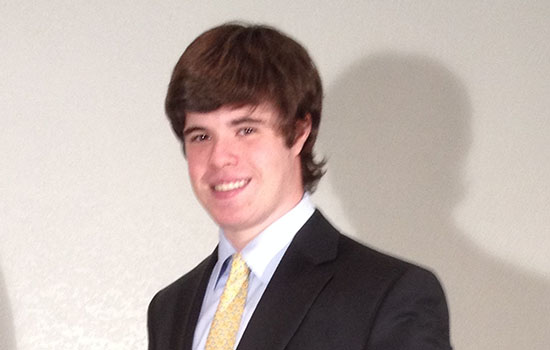Student credits hard work, support program for 4.0
Student SpotlightAlex Besen, fourth-year biomedical sciences student
Brittany Bateman and Barbie Pitts
Alex Besen, a fourth-year biomedical sciences student, is a member and mentor of RIT’s Spectrum Support Program.
Alex Besen is a fourth-year biomedical sciences student and member of RIT’s Spectrum Support Program, which provides support for students with autism spectrum disorders. The Chappaqua, N.Y., native is also an SSP mentor, student ambassador for University Studies, secretary for Model United Nations, peer adviser for YearOne, teaching assistant for anatomy and physiology and president and secretary for the RIT chapter of the Phi Sigma Pi National Honor Fraternity.
Question: What brought you to RIT?
Answer: I liked what RIT had to offer in terms of facilities and support from SSP. Plus, RIT was the only school I applied to that guaranteed me on-campus housing, so that helped seal the deal.
Q: Why did you choose to study biomedical sciences?
A: I was an undeclared major my first year and an ultrasound major my second year before I finally decided I wanted to major in biomedical sciences this year. I’ve always liked math and science and healthcare is something I’ve always had an interest in — I was actually an emergency medical technician for a little while before coming to RIT, but I couldn’t keep doing it because it was so stressful. I’m technically a third-year student in the literal sense but I’m a fourth-year in terms of credit.
Q: What is SSP?
A: It’s a program for students who identify themselves as falling somewhere on the autistic spectrum. SSP offers several services that help with transitioning to college, scheduling and keeping students on track. The program also offers coaching and specialized classes to students who want them.
Q: How has SSP helped you succeed?
A: I’m the kind of person who needs a lot of structure to function and SSP has really helped me to manage the greater degree of freedom that college provides. I meet with an executive functioning coach once a week to work on planning and prioritizing my schedule.
Q: What’s the secret behind your perfect GPA?
A: To be honest, I tend not to focus too much on my grades. But I think what’s worked for me is making sure I truly understand the course material rather than simply memorizing it. It’s really just a matter of devoting enough time to study and not procrastinating. If you get ahead on your work, school is much less stressful.
Q: Do you have any plans for the summer?
A: I’ll be conducting medical research with a company in Texas. I can’t say too much about it, but it’s part of an extremely groundbreaking field of study and I’m very excited to start.
Derrick Hunt compiles “Student Spotlights” for University News. Contact him at djh9758@rit.edu with suggestions.






